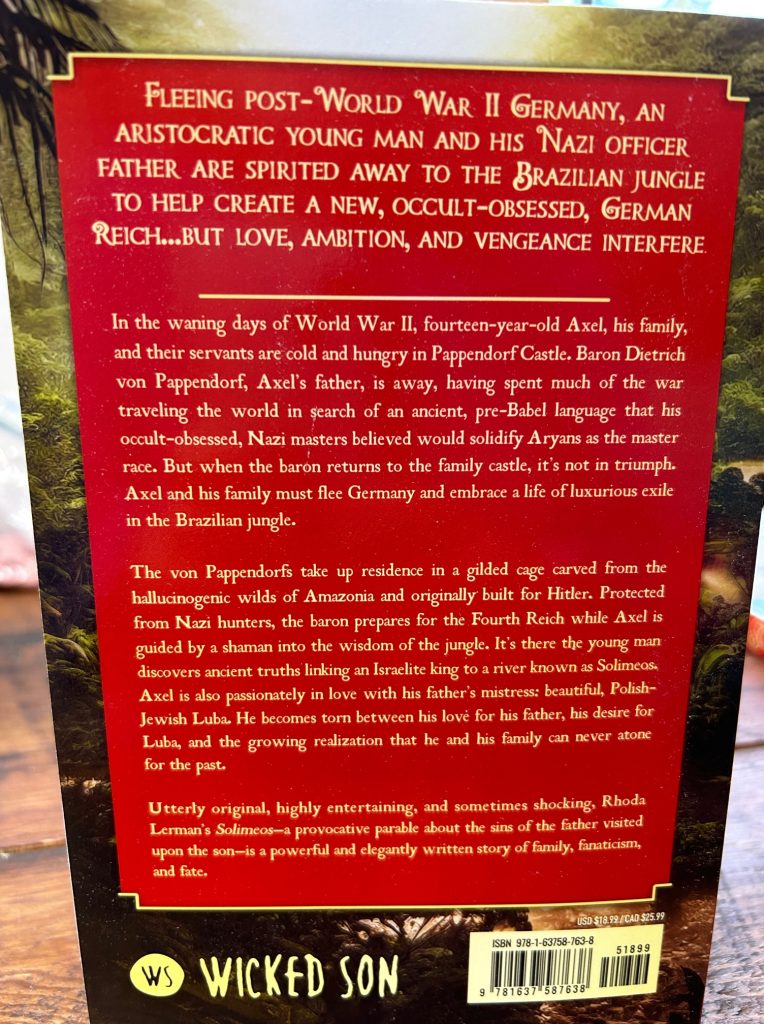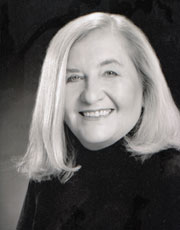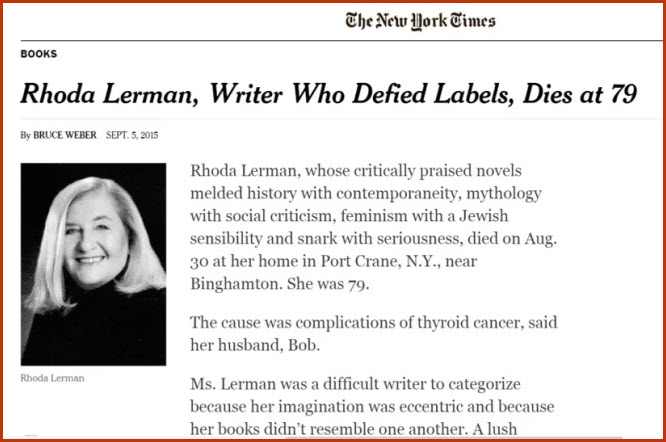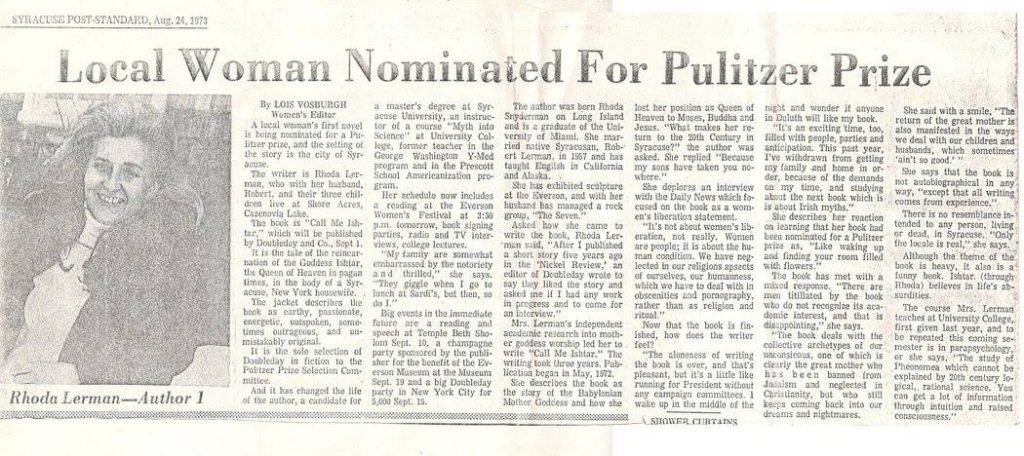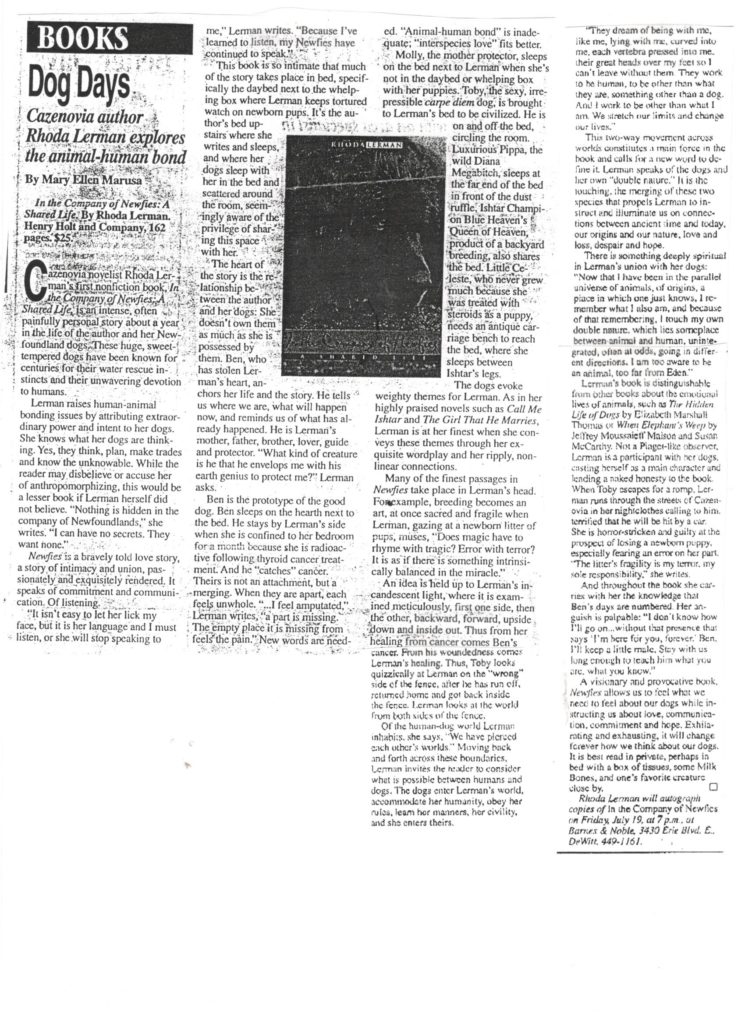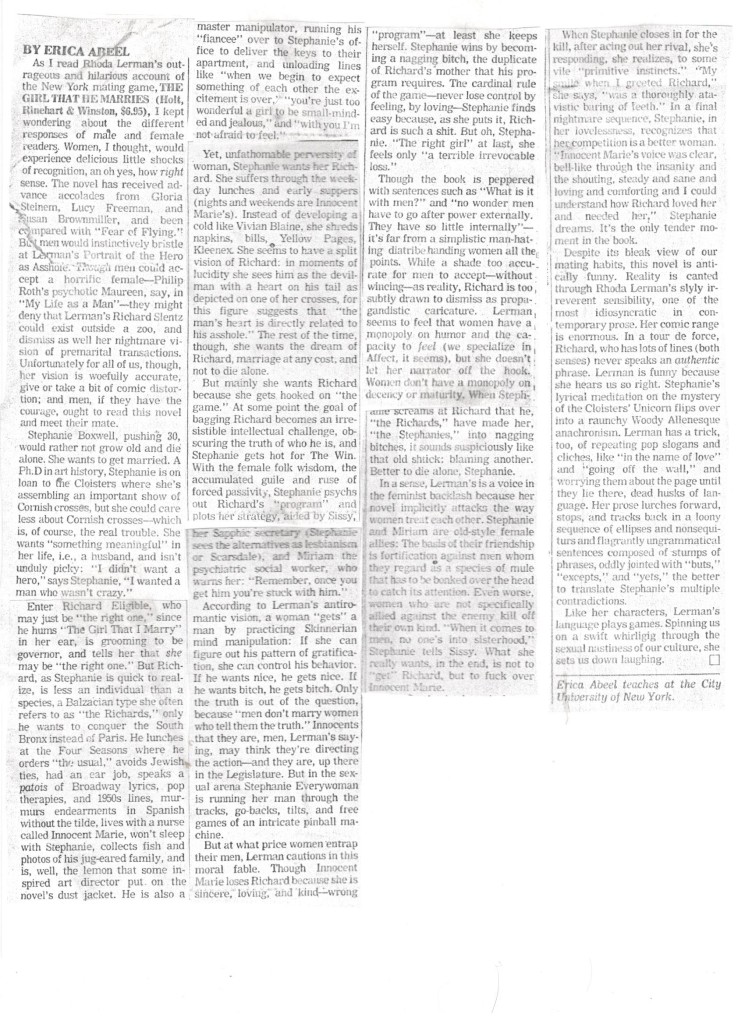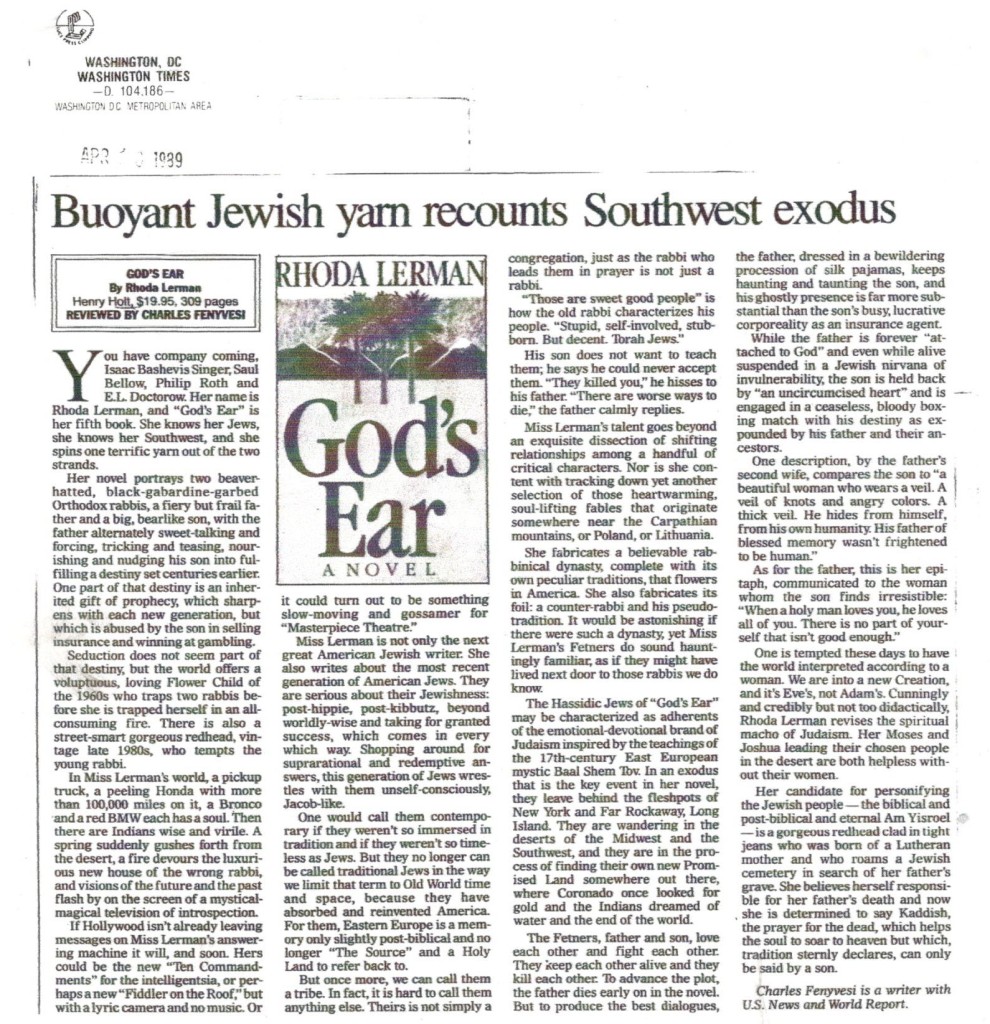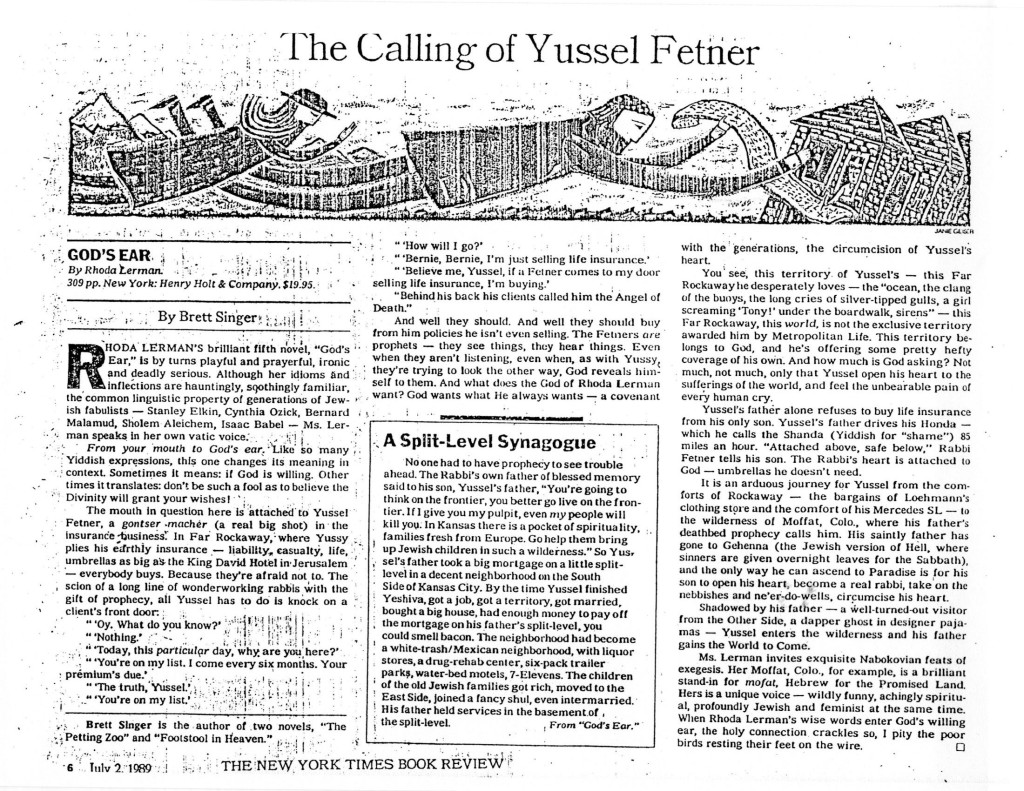Not many Port Crane residents have their passing reported in The New York Times.
Prolific author Rhoda Lerman did.
When she died on Aug. 30 at age 79, she had packed her life with accomplishments, including three children, raising Newfoundlands and updating their 70 to 80 various owners with observations about them — and writing works sometimes far ahead of their time, such as her fiction and nonfiction works about empathizing with canine companions.
In the Times article, Bruce Weber wrote that her “critically praised novels melded history with contemporaneity, mythology with social criticism, feminism with a Jewish sensibility and snark with seriousness.”
Her own obituary hailed her as “genius” and “brilliant,” quoting those who knew her.
Words like that describe one uniquely creative human being.
Early successes, sadnesses
Born in Long Island and raised in Connecticut, Rhoda and her twin sister Judy did most everything together. That included school, when both were bumped from second to fourth grade without touching third.
In fifth grade they wrote a play about the ancient Greeks together and made all the scenery for it, too.
As they progressed through the higher grades, both won all sorts of writing contests.
Their mother, Gertrude Langfur, relocated the family to be nearer her parents in Florida upon the death of her husband, Jacob, when the twins were 13.
As the years rolled along, Judy pursued her passion for cello — which Rhoda had tried playing, but quit — while Rhoda gravitated to the high school newspaper, student government and other activities, said her sister, Judy Amster, who lives in Miami.
They both won scholarships to the University of Miami, Judy for music and Rhoda for her overall grades.
There, Rhoda met the fellow student who would become the love of her life, Bob Lerman.
He graduated with his degree in business and joined the Navy, becoming stationed in California. She had one year of college to go and stayed behind.
Rhoda loved geology had intended it as her major, but school authorities wouldn’t allow her to travel with the class when they went on a field trip to Utah. “Because she was a woman, and it was the 1950s,” Bob said. “As a result she switched her major to English.”
When, years later, she received a distinguished alum award from the University of Miami, she thanked the people in the geology department who had thwarted her hopes of being a professional in that field — and she instead graduated with her degree in English education.
College done and freshly minted degree in hand, she flew out to Long Beach, Calif., and married Bob. That joyful union lasted almost 58 years.
She taught part-time in the local schools and when the algebra teacher died unexpectedly, authorities asked her to teach that class.
Unfortunately, she knew nothing about algebra, never having taken in high school.
“It happened to be my strong suit, so I’d teach her the next day’s lesson every night,” Bob said.. That meant that sometimes she had to come on board his ship.
The students loved her — as so many people would in the years to come — and she was asked to teach again the next year.
But instead the couple were relocated to Kodiak, Alaska, where she taught high school English and Bob continued his military service.
Career beginnings
Two years later, they dug into civilian life in the Syracuse area, and their first daughter, Jill, was born in 1959. Then came Julie in 1961, and son Matthew two years after that.
Later in that decade Rhoda and Bob managed a rock band, “The Seven,” which became a favorite across upstate. Rhoda also ramped up the pastime that had always enamored her, writing.
Bob credits editor Walt Shepperd, then of the Syracuse New Times, with setting the stage for Rhoda’s success.
Julie Coopersmith, then an editor for Doubleday, noticed a short story Walt published and sent a letter to Rhoda, asking her to contact the publishing house.
Rhoda didn’t respond, thinking she had received one of thousands of such letters the company routinely sent out.
Not so, and when she told an acquaintance in the publishing industry about the letter, he exploded, telling her to get herself to NYC and make amends.
“Call Me Ishtar,” her first novel, debuted under the Doubleday banner in 1973 at a book signing gala at Syracuse’s Everson Museum.
It was nominated for a Pulitzer Prize that year.
“She didn’t get it, of course, but it was quite an honor to even be considered. And for her first novel, no less,” Bob said. ”But that is how her career went: lots of honors and awards.”
Her next book, another work of fiction called “The Girl that He Marries,” debuted in 1976, followed by “Eleanor, a Novel,” in 1979.
That book took on a life of its own.
“I have had six novels published, have won a National Endowment of the Arts award, Jewish Book of the Year,” Rhoda said in an interview for this newspaper in 2014. “My book about Eleanor Roosevelt has been an opera, a musical and a one-woman show, which Jean Stapleton took around the country to sold-out audiences for a couple of years.”
It’s currently on the road now with Loretta Swit, Bob said.
Next came “Book of the Night” (1984), “God’s Ear” (1989), the prescient “Animal Acts” (1994), which used fiction as a base from which to launch her ideas about animal consciousness, and then two non-fiction works on the same topic, “In the Company of Newfies” and “Elsa Was Born a Dog, I Was Born a Human … Things Have Changed,” which she debuted at the Westminster Kennel Club show last year.
Some books were translated into French and German.
Her curriculum vitae stretches over three single-spaced pages, detailing her writings for theatre and films, speaking engagements, appointments such as serving in the cultural delegate to the autonomous government of Tibet on the first official American delegation to that nation in 1987; memberships, positions as visiting professor both of Creative Writing and Judaic Studies — and many publications in periodicals such as Cosmo.
“She once interviewed me and used me in an article about pedophilia,” said Judy, whose phone rang off the wall after the piece was published.
But first, a mom
In answering the question, “What kind of mother was Rhoda Lerman?” daughter Jill Nazimek, who lives near Boulder, Colo., formulated a long, thoughtful answer with which her sister, Vermont resident Julie Lerman, fully agrees.
“She was full of wisdom, curiosity, kindness, great writing, great jokes, love and laughter,” Jill wrote. “If she wanted to know about something, she didn’t let anything get in her way to find out. If she thought something might be good or interesting she would pursue it and give it a try. She gave us all of the opportunities that we could want. Lessons, travel, love, dinner on the table, a great place to grow up, exposure to many facets of life. She spent a lot of our (and her) youth researching, travelling to research her books, writing, entertaining us, her friends, our friends, family. At my parents’ house the door was open and there was always room for another person at the table. Whether it was the neighbor, a random college friend one of us brought home, the secretary to the Dalai Lama or Jean Stapleton. She was surrounded by famous and important people but never had an ounce of arrogance in her.”
The last quarter-century, Rhoda and Bob’s lives revolved around their Blue Heaven Newfoundland dogs, which they bred and showed — and about which Rhoda was spotlighted several times in this newspaper.
“She was a ground breaker and explorer of ideas and new truths,” Jill continued. “She was always ahead of the curve in the dog world, with her writing, showing all three of us that we could take any path that we chose and be successful. There were no molds in our house. No absolute path to follow. And we all found our own. All five of us.”
Son Matthew, who lives in San Diego, interposed the image of the famous woman who spoke at his Cazenovia High School graduation with the regular mom who cooked and cleaned and listened and loved her kids above all else.
“My mom traveled the world — she wasn’t a PTA mother at all,” he said with a laugh.
For much of his young life, he had focused on excelling in competitive-level skiing, and Rhoda would take him to the slopes six days a week.
“She did everything a typical mom did — and more — but had her own gig, too,” he said.
When he needed to rant at the Universe for a serious injury that sidelined his hoped-for career, she listened as he decompressed on the family’s sidewalk.
“She let me just talk, scream, just get it all out,” he said.
When he lived in Virginia Beach, she mailed him his favorite Jewish dessert.
Up until the final stages of the illness that claimed her life, Rhoda remained the mom Matthew had always relied on.
“The last day I visited her, she put her hand on my face and said, ‘Don’t worry, I’ll see you again,’” he said. “That was Mom, still protecting her baby.”
And as the end undeniably neared, she told Bob, “I can’t wait to see what’s on the other side.”
“That was typical Rhoda,” he said.
Even after more than a half century, he is still madly in love with her just as when they first met. “It never went away,” he said. “She was my best friend. We were very lucky.”
At the time of Rhoda’s death she was busy writing a novel that had already occupied her for a decade.
A copy of the manuscript sits in the living room of twin sister Judy’s house.
“I grabbed it by accident and burst into tears,” Judy said. “I still can’t talk about her in the past tense.”
The world recognized Rhoda Lerman’s name in conjunction with her many books, But those who knew her loved her for many reasons far beyond her fame.
Rhoda is survived by husband Robert, daughters Jill Nazimek (Greg) and Julie Lerman (Rich Flynn) and one son, Matthew Lerman; twin sister, Judy Amster (Walter); two grandsons, Josh Lerman and Zack Lerman; an uncle, Josh Langfur; and a number of cousins, nephews and nieces.
Email Valerie Zehl at vzehl@pressconnects.com.

